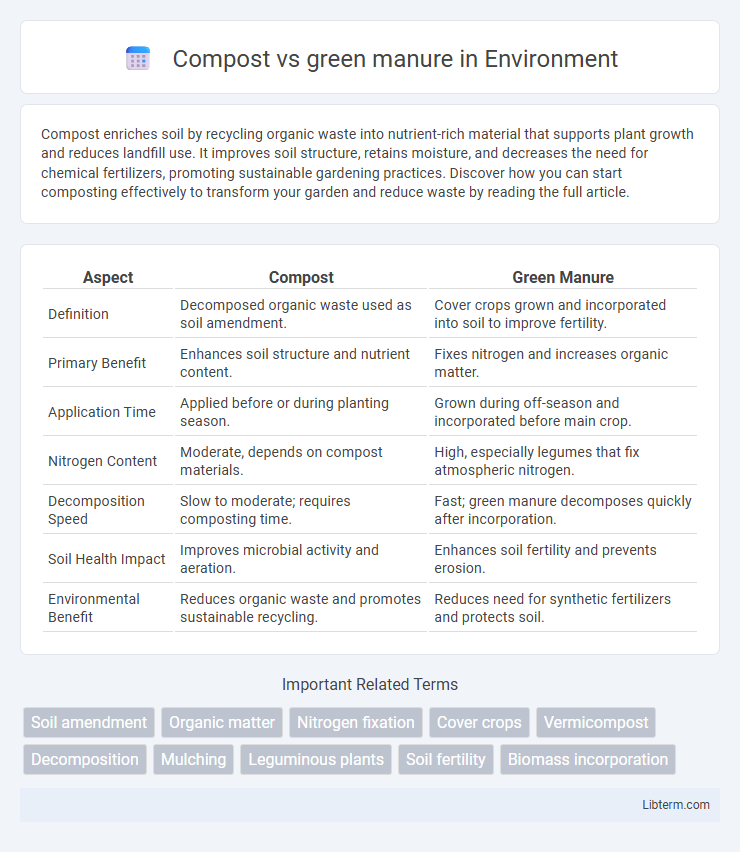Compost enriches soil by recycling organic waste into nutrient-rich material that supports plant growth and reduces landfill use. It improves soil structure, retains moisture, and decreases the need for chemical fertilizers, promoting sustainable gardening practices. Discover how you can start composting effectively to transform your garden and reduce waste by reading the full article.
Table of Comparison
| Aspect | Compost | Green Manure |
|---|---|---|
| Definition | Decomposed organic waste used as soil amendment. | Cover crops grown and incorporated into soil to improve fertility. |
| Primary Benefit | Enhances soil structure and nutrient content. | Fixes nitrogen and increases organic matter. |
| Application Time | Applied before or during planting season. | Grown during off-season and incorporated before main crop. |
| Nitrogen Content | Moderate, depends on compost materials. | High, especially legumes that fix atmospheric nitrogen. |
| Decomposition Speed | Slow to moderate; requires composting time. | Fast; green manure decomposes quickly after incorporation. |
| Soil Health Impact | Improves microbial activity and aeration. | Enhances soil fertility and prevents erosion. |
| Environmental Benefit | Reduces organic waste and promotes sustainable recycling. | Reduces need for synthetic fertilizers and protects soil. |
Introduction to Compost and Green Manure
Compost is decomposed organic matter that enhances soil fertility by improving nutrient content and microbial activity. Green manure consists of specific plants grown and then incorporated into the soil to increase organic matter and nitrogen levels naturally. Both methods enrich soil health but differ in application timing and nutrient release rates.
Definition and Key Differences
Compost is decomposed organic matter created through microbial breakdown of kitchen scraps, yard waste, and other biodegradable materials, enriching soil with nutrients and improving its structure. Green manure involves the cultivation and incorporation of specific cover crops, such as clover or legumes, directly into the soil to enhance fertility through nitrogen fixation and organic matter addition. The key difference lies in compost being a pre-processed soil amendment, while green manure acts as a living cover crop that is tilled into the soil to provide immediate nutrient benefits.
Benefits of Using Compost
Compost enhances soil structure by increasing organic matter content, which improves water retention and nutrient availability for plants. It supports beneficial microbial activity, promoting healthier plant growth and disease resistance. Using compost reduces the need for chemical fertilizers, leading to sustainable and eco-friendly gardening practices.
Advantages of Green Manure
Green manure enhances soil fertility by fixing atmospheric nitrogen through legumes, reducing the need for synthetic fertilizers. It improves soil structure, increases organic matter content, and promotes beneficial microbial activity, leading to better water retention and aeration. Green manure crops also suppress weeds, reduce erosion, and provide a sustainable, cost-effective alternative to compost in crop rotation systems.
Nutrient Release and Soil Health
Compost provides a slow and steady nutrient release, enriching soil with organic matter and enhancing microbial activity to improve soil structure and water retention. Green manure, often consisting of leguminous plants, fixes atmospheric nitrogen and releases nutrients more rapidly upon decomposition, boosting soil fertility. Both practices promote soil health by increasing organic content and supporting diverse soil ecosystems, but compost offers longer-term benefits while green manure delivers quicker nutrient availability.
Application Methods Compared
Compost application involves spreading fully decomposed organic material directly onto soil surfaces or incorporating it into the root zone to enhance soil structure and nutrient content. Green manure uses cover crops that are mowed or tilled back into the soil before flowering, providing a fresh source of nitrogen and organic matter through decomposition. Compared to compost, green manure requires precise timing of crop incorporation to maximize nutrient release and minimize biomass loss during decomposition.
Environmental Impact and Sustainability
Compost enhances soil health by recycling organic waste, reducing landfill contributions and greenhouse gas emissions while improving nutrient retention and water retention in the soil. Green manure crops fix atmospheric nitrogen, enrich soil fertility naturally, and prevent erosion, promoting long-term agricultural sustainability without synthetic fertilizers. Both practices reduce chemical inputs and support soil biodiversity, but compost offers broader waste reduction benefits beyond field application.
Cost and Resource Considerations
Compost requires an initial investment in materials like organic waste and a dedicated space for decomposition, but it provides nutrient-rich soil amendments that improve long-term soil structure and fertility. Green manure involves growing specific cover crops, which may require seed costs and labor for planting and incorporation, but it offers a cost-effective, natural nitrogen source and enhances soil organic matter without the need for external inputs. Evaluating local availability of resources, labor capacity, and crop cycles is crucial for choosing between compost and green manure to optimize cost efficiency and sustainable soil management.
Best Practices for Integrating Both
Integrating compost and green manure optimizes soil health by combining nutrient-rich organic matter with nitrogen-fixing cover crops, enhancing soil fertility and structure. Best practices include applying well-decomposed compost during planting to improve soil organic content while using green manure crops like clover or vetch in rotation to naturally replenish nitrogen levels. Timing the incorporation of green manure before its flowering stage maximizes nutrient availability, and regularly adding compost maintains microbial activity and moisture retention for sustainable crop growth.
Choosing the Right Option for Your Garden
Compost enhances soil structure and nutrient content through decomposed organic matter, while green manure involves planting specific cover crops to naturally enrich the soil with nitrogen and organic matter. For quick nutrient release and improved soil texture, compost is ideal, whereas green manure suits long-term soil fertility and erosion control. Assess your garden's needs, growth stages, and available time to determine whether compost or green manure optimally supports your soil health and plant growth goals.
Compost Infographic

 libterm.com
libterm.com